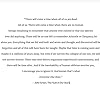Namya Bhandari
asked
Rick Riordan:
Hello sir, I am a huge fan of yours. I had a question that why did you kill Jason instead of any other character you could have? Was it just a spur of the moment thing, or was there a specific reason for killing him? Keenly awaiting your response.
Rick Riordan
SPOILER, by the way . . .
So I've answered this before, but the general answer about why people die sometimes in books is here:
I usually don't quote the god of war, but as Mars says to Frank: "Life is only precious because it ends, kid." Deaths are very hard to write. I am closer to these characters than anyone, because I created them and lived with them for so many years. I shed tears when a character says their final goodbye. That said . . . you can't have the good times without the bad times, even in fiction. The tragedies are what make us appreciate the triumphs. And the stakes have to be real. Percy warns us on page one of the Lightning Thief: "Most of the time, being a demigod gets you killed." He wasn't kidding. It isn't nice, or fair, or joyful, but death is part of life, and I've found that fiction is a good place especially for young readers to process hard feelings as well as pleasant ones. Grief, alas, is part of what makes us human, and that's something Apollo learns in ToA, and a big reason he is able to embrace his own humanity.
As for Jason in particular . . . isn't it a bit strange that when a hero does something great, nobody credits the author with making that decision? "Wow, Rick, thanks for defeating that Titan and saving the world!" That's the hero's action, not mine, and rightly so. But when a villain does something villainous, the response is always, "Rick, why did you do that terrible thing?" The question is not how could I kill Jason. The question is how could Caligula, arguably the most terrible, cruel, demented Roman emperor of all time, NOT kill him? Given the arc of the five-book narrative, there was no way things could have happened any differently.
So I've answered this before, but the general answer about why people die sometimes in books is here:
I usually don't quote the god of war, but as Mars says to Frank: "Life is only precious because it ends, kid." Deaths are very hard to write. I am closer to these characters than anyone, because I created them and lived with them for so many years. I shed tears when a character says their final goodbye. That said . . . you can't have the good times without the bad times, even in fiction. The tragedies are what make us appreciate the triumphs. And the stakes have to be real. Percy warns us on page one of the Lightning Thief: "Most of the time, being a demigod gets you killed." He wasn't kidding. It isn't nice, or fair, or joyful, but death is part of life, and I've found that fiction is a good place especially for young readers to process hard feelings as well as pleasant ones. Grief, alas, is part of what makes us human, and that's something Apollo learns in ToA, and a big reason he is able to embrace his own humanity.
As for Jason in particular . . . isn't it a bit strange that when a hero does something great, nobody credits the author with making that decision? "Wow, Rick, thanks for defeating that Titan and saving the world!" That's the hero's action, not mine, and rightly so. But when a villain does something villainous, the response is always, "Rick, why did you do that terrible thing?" The question is not how could I kill Jason. The question is how could Caligula, arguably the most terrible, cruel, demented Roman emperor of all time, NOT kill him? Given the arc of the five-book narrative, there was no way things could have happened any differently.
More Answered Questions
Rick Riordan
451,502 followers
About Goodreads Q&A
Ask and answer questions about books!
You can pose questions to the Goodreads community with Reader Q&A, or ask your favorite author a question with Ask the Author.
See Featured Authors Answering Questions
Learn more





